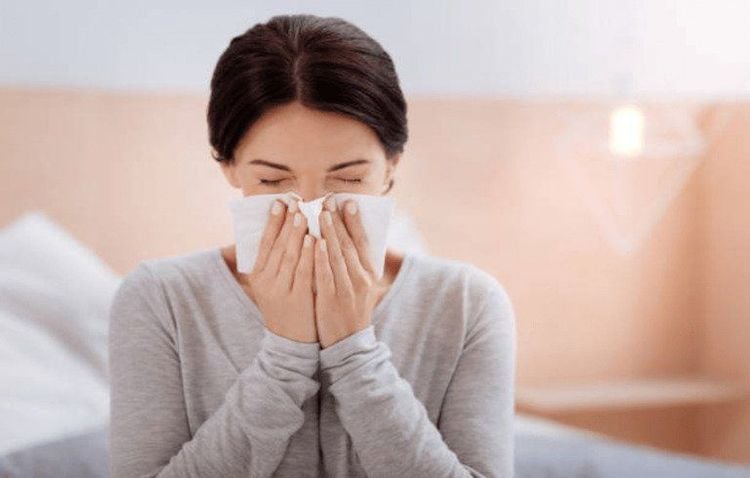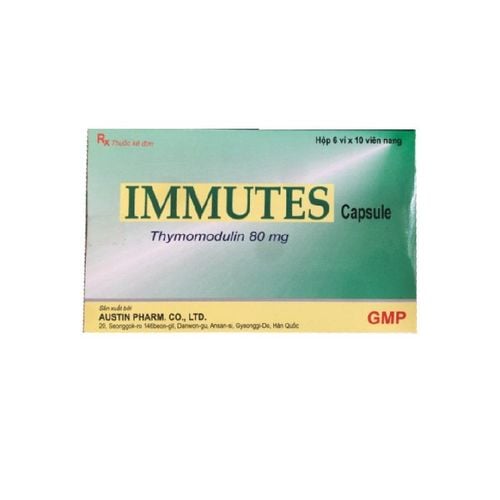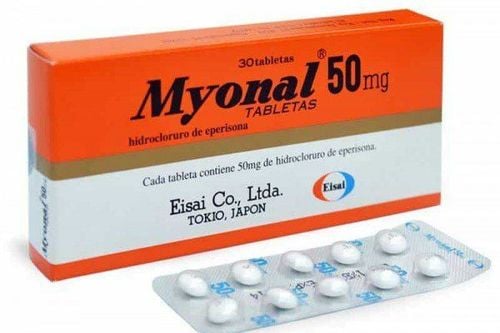This is an automatically translated article.
Wine allergies work similarly to other food allergies. Your immune system mistakes harmless proteins for a threat and large amounts of antibodies, such as immunoglobulin E (IgE), are produced. These antibodies release histamine and other chemicals, which can cause symptoms of an allergic reaction. The article will help you better understand what a wine allergy is, its symptoms and how to avoid it.1. Symptoms of a Wine Allergy
Symptoms of a wine allergy in particular or to other types of alcohol in general can be similar to those of other food allergies. Some of the symptoms that have been reported in cases of wine allergy include:Runny or stuffy nose Sensation of heat or itching in the lips, mouth or throat Rash, possibly itching Digestive disturbances such as: : nausea, vomiting or diarrhea Shortness of breath Swelling of lips, mouth, or throat Anaphylaxis
Anaphylaxis is a type of serious allergic reaction and a medical emergency. It can happen right after eating or drinking grape products, including wine, raisins, and fresh grapes. A 2005 study identified a specific protein found in grapes as an allergen. Seek immediate medical attention if you suspect that you or someone you know is experiencing anaphylaxis. Typical symptoms of anaphylaxis to look out for include:
Rash, which may be itchy Difficulty breathing, which may include wheezing or coughing Swelling of the throat Tachycardia Low blood pressure (low blood pressure) Confusion gastrointestinal disturbances including: nausea, vomiting or diarrhea Feelings of anxiety, restlessness, irritability Adverse reactions to foods: Allergies versus intolerances
It is important to distinguish between allergies alcohol intolerance and alcohol intolerance. An allergy is an abnormal immune response to an ingredient in wine. Some people, especially those with asthma, may also be sensitive to sulfites, which is an immune response. Sulfite sensitization is generally classified as an allergy and can lead to mild to severe symptoms.
Intolerance is the inability of the body to break down alcohol effectively, which can be genetic or develop over time. Intolerance can cause symptoms very similar to an allergy, and the two types of reactions are often confused. Symptoms of intolerance may include:
Red skin Runny or stuffy nose Headache or migraine Nausea or vomiting Tachycardia Low blood pressure (low blood pressure) For people with asthma , symptoms of the disease can be made worse in the case of alcohol intolerance.

Nghẹt mũi, chảy nước mũi sau khi uống rượu vang là dấu hiệu bị dị ứng với rượu vang
2. Allergens in Wine
There are several potential allergens that can be found in wine. These include:Grapes, which include specific proteins found in the composition of alcohol Ethanol is the specific alcohol found in wine Yeast, fermenting sugars from grapes into ethanol Sulfite, which can be produced naturally in in wine or added by winemakers Smoothing agent, added during the manufacturing process and may include proteins derived from milk, eggs and fish 2.1. Does the type of wine matter? In general, most wines contain all of the potential allergens outlined above. However, it seems that red wine will cause the most symptoms. A 2005 study surveyed people who experienced upper respiratory tract symptoms in response to alcohol. Reported symptoms include nasal congestion and sneezing. The investigators found that 83% of respondents reported that their symptoms developed after drinking red wine. White wine was the next most popular, with 31% reporting it as a symptom trigger. Another, more recent study evaluated allergies and allergy-like symptoms after drinking wine. They found that more people reported symptoms after drinking red wine than white wine.
The answer to the question of why red wine is more allergenic to users than other wines is so far not clear, it may be related to food. The fact is that red wine contains more sulfites and is fermented with the skins still on while white wine does not. One of the confirmed grape allergens is in grape skins. Reaction to wine can also be dependent on the specific grape used in the wine. For example, one study looked at the occurrence of negative reactions in people with hypertension after drinking wine containing Merlot grapes.
2.2. Can people with a wine allergy be allergic to other things? If you have an allergic reaction to wine, you may also react to other foods.
Beer Beer shares some potential allergenic ingredients with wine, such as ethanol, sulfites, and yeast. Therefore, it is possible that you will be allergic to both beer and alcohol. In fact, a large 2017 study documented cases of allergic reactions after consuming products, such as beer, wine, cider, and champagne. After being tested for allergies, it was confirmed that they were allergic to yeast.
Foods used to make wine The alcohol used in wine can contain proteins derived from eggs, milk and fish. Alcohol-forming substances must be removed from wine during winemaking. This is done through procedures such as filtering. A 2011 study examined reactivity in humans. Although no fines were detected in the wine, a very minor skin reaction was observed in people with milk, egg or fish allergies. Because of the small size of the reaction, the researchers concluded that the agents pose a very low risk.

Bạn cũng có thể bị dị ứng với bia nếu bạn bị dị ứng rượu vang
People who are allergic to grapes or grape products may also have reactions to other foods. A 2006 study observed that people with a grape allergy may also be allergic to the following foods, in order of prevalence:
Apples Peach Peanuts Peanuts Cherries Walnuts Strawberries Hazelnuts Pistachios Pistachios Insect venom Sometimes, insects, such as bees and wasps, can fall into the wine and be crushed with the grapes. In fact, one study of five individuals found that a reaction was observed after drinking freshly prepared wine or grape juice. Further research showed that this reaction was caused by the insect venom allergen present in the alcohol. However, no reactions were observed in aged wines.
3. 5 signs you are allergic to wine
While people can be allergic to alcohol in general, allergies to specific alcohols are more likely to be caused by sulfites, histamines, or other compounds in wine (which can be found in lower or complete levels). not found in other alcoholic beverages). Red wines tend to contain more of the sometimes problematic ingredient than white wines, because some are derived from the skins of grapes (and therefore not in white wines). While grape skins may offer some of the health benefits of wine, they're made worse by the negatives of an actual allergic reaction. Here are some ways to tell if you have an alcohol allergy3.1. Women Sadly, according to one study, women are twice as likely to develop an alcohol allergy than men. Obviously, this is not enough information to diagnose an alcohol allergy. However, women who enjoy drinking wine may need to reconsider their preference
3.2. Wheezing or difficulty breathing Wheezing, shortness of breath, coughing, and other respiratory symptoms can be caused by sulfide radicals in wine (especially for people with asthma). It is normal to feel tired at the end of the day, but shortness of breath is not normal, so feeling short of breath or feeling uncomfortable in your body is most likely due to the effects of wine.
3.3. Headache Wine often contains histamine, and histamine in the body often produces allergic reactions and headaches. Think of seasonal allergy symptoms that often come on at certain times of the year. However, before you give up alcohol completely, you can try one of the low-histamines on the market.
3.4. Hives, flushing, and rash are nonspecific reactions to irritants. These symptoms may appear in people with an alcohol allergy as a reaction to alcohol, sulfites or histamines, or be related to medications they are taking or an existing health condition such as rosacea.
3.5. Switch Drinks and Feel Better Although testing for wine-related allergies is complicated due to the many chemical compounds in wine, there are some simpler tests we can do ourselves to conclude that you may have a wine-related reaction. If you can switch to beer or other types of alcohol and consume as many units of alcohol as you normally would without the same reaction, then that means wine is the culprit.
3. Treatment and prevention of wine allergy
3.1. How to Treat Wine Allergies Antihistamines Treating a mild reaction to wine may involve taking an antihistamine. They can be purchased without a prescription or through a doctor's prescription.Epinephrine auto injector (EpiPen) Because a wine allergy and sulfite sensitivity can lead to anaphylaxis - a serious condition, you may want to consider carrying an epinephrine auto injector (EpiPen). This emergency use medicine can be used to treat severe allergic reactions while other medical help is waiting.
Oral immunotherapy You may have heard that some people with food allergies are given gradually increasing amounts of an allergen orally to promote tolerance. This is called oral immunotherapy. While there isn't much research to support this approach to treating wine allergies, it was tested in someone with a very severe grape and wine allergy. Oral tolerance has been achieved with increasing doses of wine.

Bạn có thể được kê thuốc kháng Histamine nếu bị dị ứng rượu vang
Sometimes, reading labels carefully can help keep you informed. For example, a wine label will be required to notify you if the wine contains sulfites. However, caution should be exercised when drinking wine, as the side effects can be serious. It's best to avoid wine entirely - and any other alcoholic beverages to which you're allergic.
Although allergies to wine and other alcohols are rare, they can happen. Wine contains many allergens, including grapes, yeast, and ethanol. If you have a wine allergy, you may experience symptoms such as a rash, stuffy nose, wheezing, or a tingling sensation around your mouth and throat. In some cases, the reaction can be very serious, leading to anaphylaxis. If you experience allergy-like symptoms when drinking wine, you should seek medical attention. Doctors can assist in finding the cause of your alcohol allergy.
If you have any questions related to the topic of nutrition for the body that need advice from a doctor, you can leave your question in the ASK VINMEC DOCTOR section directly on the hospital website. Your question will be sent to the doctor and you will receive a consultation as soon as possible!
Please dial HOTLINE for more information or register for an appointment HERE. Download MyVinmec app to make appointments faster and to manage your bookings easily.
Reference sources: healthline.com, webmd.com, bustling.com












